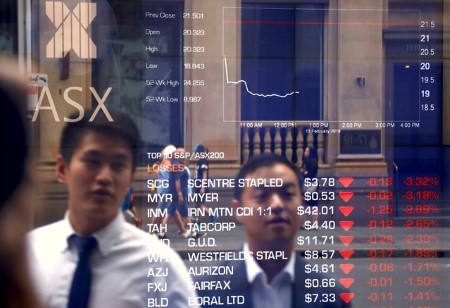




Policy Rate Updates: BSP outlook — cloudy with a chance of rate cut
 DOWNLOAD
DOWNLOAD

January Economic Update: Growth slows, prices rise
 DOWNLOAD
DOWNLOAD

Inflation Update: Up, up, and away?
 DOWNLOAD
DOWNLOAD


Asia shares edge higher as dollar eases

MSCI’s broadest index of Asia-Pacific shares outside Japan .out a gain of 0.3% early on Friday. But it was headed for a weekly drop of 1.2%, battered by a slew of outsized rate hikes from global central banks this week – and the expectations of more to come.
Japan’s Nikkei rose 0.3%, Chinese blue chips were up 0.2%, while Hong Kong’s Hang Seng Index advanced 0.4%.
Overnight, Wall Street’s main indexes posted modest gains after heavy selling earlier in the week. S&P 500 futures rose 0.3% and Nasdaq futures was up 0.5%, in a sign of improved risk appetite as markets stabilised.
Fed chair Jerome Powell on Thursday said the bank is “strongly committed” to controlling inflation but there remains hope it can be done without the “very high social costs” involved in prior inflation fights.
“With Powell offering little in the way of push-back against market pricing, we think that the FOMC will affirm market expectations. In addition, we now expect a 50 bp (basis point) hike in November, though it is a close call,” said analysts at Barclays.
US rate futures have priced in an 86% chance the Fed will hike by another 75 basis points at this month’s meeting, which would increase the Fed funds rate to 3.0% to 3.25%. That was up from a 77% probability a day earlier.
US Treasury yields climbed slightly on Friday, with the yield on benchmark two-year notes edging 4 basis points higher to 3.5264%. The yield on 10-year bonds stood at 3.3284%, compared with its previous close of 3.2920%.
Across the Atlantic, the European Central Bank raised interest rates by a record 75 basis points and also signalled further hikes to fight inflation, even as the bloc’s economy is heading for a likely winter recession.
That sent euro zone government bond yields soaring and supported the euro. Germany’s two-year bond yield climbed more than 20 bps to 1.326%, its highest since 2011, while 10-year bond yields were up 14 bps to 1.71%.
The euro gained 0.5% to USD 1.0049 and managed to stand above parity with the U.S. dollar.
The dollar eased 0.3% against a basket of major currencies.
For the week, though, it has surged 2.6% against the rate-sensitive yen. The yen has been a victim of the dovish monetary stance from the Bank of Japan, in contrast with rate hikes elsewhere.
Oil prices turned down in early trade on Friday and were headed for a 4% weekly drop on worries that central banks’ aggressive rate hikes and China’s COVID-19 curbs will hurt demand.
US crude dipped 0.1% to USD 89.07 a barrel while Brent crude rose to USD 89.07 per barrel.
Elsewhere, Britain’s new leader, Liz Truss, on Thursday announced a cap on soaring consumer energy bills for two years to cushion the economic shock of war in Ukraine.
Gold was slightly higher. Spot gold was traded at USD 1713.99 per ounce.
(Editing by Kenneth Maxwell)
This article originally appeared on reuters.com





 By Reuters
By Reuters